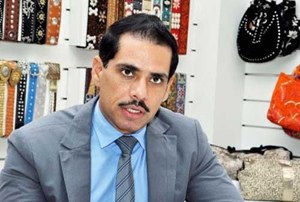 Chandigarh, Aug 10: Robert Vadra's land deals in a village in Haryana have returned to haunt the Congress party and its chief with whistleblower IAS officer Ashok Khemka alleging that Vadra "falsified documents" for 3.53 acres of land in Gurgaon and "pocketed" large premium on a commercial colony license.
Chandigarh, Aug 10: Robert Vadra's land deals in a village in Haryana have returned to haunt the Congress party and its chief with whistleblower IAS officer Ashok Khemka alleging that Vadra "falsified documents" for 3.53 acres of land in Gurgaon and "pocketed" large premium on a commercial colony license.
In his "voluminous reply" submitted to Haryana government's three-member enquiry committee set up in October last to look into Vadra-DLF deal, Khemka is understood to have alleged that Vadra, who is Congress President Sonia Gandhi's son-in-law, executed a series of "sham transactions" for 3.53 acres of land in Shikohpur village of Gurgaon.
Vadra "pocketed" a huge premium on a commercial license through money that he could account for, Khemka alleged.
The IAS officer alleged that the Haryana's Department of Town and Country Planning (DTCP) "ignored rules and regulations to allow crony capitalists operating as middlemen to flourish and appropriate market premium of a license."
"The DTCP aided Vadra in making these sham transactions," he alleged.
Khemka, who submitted his reply on May 21, says that both the sale deed of February 12, 2008 through which Vadra's company 'Skylight Hospitality' bought land from 'Onkareshwar Properties' and Letter of Intent for granting a commercial license to his company issued by DTCP in March 2008 are "sham transactions" made to enable Vadra to collect market premium.
"If there was no payment as alleged in the registered deed, can it it be said that the registered deed conferred ownership title over the said land upon Skylight Hospitality by virtue of the sham sale," he questions.
Khemka, who had cancelled a land mutuation deal between Vadra and DLF last October, claims that "there was no promise to pay in the future in the registered deed."
No price was paid as claimed in the registered deed. The sale registered in the said deed cannot, therefore, be called a "sale" in true sense of the term, legal or moral and it cannot be said that Skylight
Hospitality became owner of the land in question by virtue of sale registered in the deed, Khemka is understood to have said in his report running into some 100 pages.
While Khemka's reply has gone public, the officer, on being approached by PTI here said, "I will not speak to the media on this issue."
Haryana Chief Secretary P K Chaudhary said, "We are examining the reply (by Khemka)".
The Haryana government's committee had earlier this year concluded that the orders passed by Khemka initiating an enquiry into Vadra's land deals were "without jurisdiction, inappropriate and not covered under any provisions of any statute or rules."
Besides, the committee also held that the order by Khemka cancelling the land mutation was improper.
Demanding a white paper on the transfer of all such licenses permitted in the past to expose the "loot of public wealth," Khemka writes that the DTCP had issued various types of colony licences for a total of 21,3666 acres in the last eight years of the Bhupinder Singh Hooda government's tenure between 2005 to 2012.
He points that if the market premium for a colony licence is assumed to be as low as Rs one crore per acre, the land licensing scam in the past eight years is worth around Rs 20,000 crore.
"At the premium of Rs 15.78 crore per acre that Vadra earned, this figure would jump to Rs 3.5 lakh crore," he claims.
He alleged in the letter the DTCP permitted Skylight to transfer the license to DLF in April 2012 and the licensed land was finally sold to DLF on September 18, 2012.
"By allowing the transfer of license issued in the name of Skylight to DLF, the DTCP created a black market for trading in licenses where cronies are issued licenses which are later sold or transferred with permission of the authority for a fat consideration to the real developers," he writes.
On August 5, 2008 Skylight Hospitality entered into an unregistered collaboration agreement with DLF Universal.
Khemka observes that this led to loss of crores of revenue to the state exchequer due to a collaboration agreement of this kind has to be registered.
The opposition Indian National Lok Dal (INLD) has demanded a probe into the reply by Khemka by a sitting judge of the High Court.
INLD leader Abhay Chautala, who is also MLA from Ellenabad, said his party had thrice raised this issue in the Vidhan Sabha, but the Speaker always tried to suppress it.
"All such transactions are done by the Hooda government to appease Sonia," he alleged





Comments
Add new comment